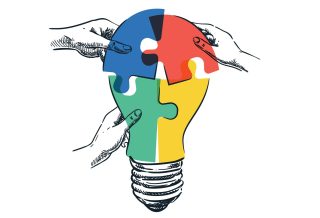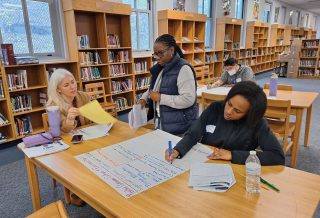FOCUS
Process For Discovery
Project-based learning builds teachers' collaboration skills
By Andrew Miller
Categories: Collaboration, Learning designsOctober 2017
Vol. 38 No 5
Read the remaining content with membership access. Join or log in below to continue.
Sed ut perspiciatis unde omnis iste natus error sit voluptatem accusantium doloremque laudantium, totam rem aperiam, eaque ipsa quae ab illo inventore veritatis et quasi architecto beatae vitae dicta sunt explicabo. Nemo enim ipsam voluptatem quia voluptas sit aspernatur aut odit aut fugit, sed quia consequuntur magni dolores eos qui ratione voluptatem sequi nesciunt. Neque porro quisquam est, qui dolorem ipsum quia dolor sit amet, consectetur, adipisci velit, sed quia non numquam eius modi tempora incidunt ut labore et dolore magnam aliquam quaerat voluptatem.
Andrew Miller (andrew@andrewkmiller.com) is an instructional coach at the Shanghai American School in Shanghai, China.
How to design project-based learning
Instructional leaders have a number of factors to consider in designing project-based learning professional learning. The project needs to have goals and outcomes connected to the school and/or district, appropriate voice and choice, and should be an ongoing investigation over time.
The project should be manageable and have specific priorities to develop and assess. The learning for the project should also be tangible and meaningful so that it can be assessed, including a public component or demonstration of learning. It is also important to include times for collaboration and times for independent learning.
Use the following questions to facilitate your own design.
These questions can provide a framework for planning and implementing project-based learning professional development. As we continue to improve our professional learning practices, we need to use learning methods that work for our students. Project-based learning can be a powerful tool to increase teacher learning and engagement in reflecting on and improving professional practice.
- What are the goals and outcomes for the project? Teachers should be engaged in learning about professional practice. These could be goals related to specific instructional strategies, student achievement data, or even collaborative and school culture goals.
- How will the project be meaningful, authentic, and challenging? The professional learning project should be connected to the classroom, and teachers need to see it as directly applicable to their daily work. The project should also be a challenge and push teachers outside of their comfort zone in appropriate ways.
- How will teachers have voice and choice? While there may be specific goals for all teachers in the professional learning project, teachers need voice and choice throughout. This might take the form of teams investigating similar problems of practice, choice in what products they will produce or share, or even when they choose to do specific components of the project.
- How will teachers be assessed? The project should include specific products or deliverables, including authentic work units, discovery cards, or presentations. There should be formative assessments that might include feedback sessions, protocols, or even ongoing reflection journals.
- How will teachers share their work and learning? A public component is critical to any project. It helps build accountability and culture. Teachers should share their work with each other and perhaps with an even larger audience.
- How will the project be inquiry-based and sustained over time? Instead of just a one-time work, the project must be a sustained inquiry process. There must be an effective launch and driving question for the project to focus the work. The launch could be a video, a provocative article, or an engaging workshop to start the process. In addition, there needs to be a focus on deeper learning through questioning.
- What variety of strategies and structures will be embedded in the project? Project-based learning leverages a variety of instructional strategies. An effective professional learning project should include protocols, workshops, classrooms visits, and other effective adult learning strategies.
References
Beckett, G.H. & Miller, P.C. (2006). Project-based second and foreign language education: Past, present, and future. Charlotte, NC: Information Age.
Edutopia. (2013). Knowledge in action research: Results to date. Available at www.edutopia.org/knowledge-in-action-PBL-research-results.
Garmston, R. & Wellman, B. (2016). The adaptive school: A sourcebook for developing collaborative groups (3rd ed.). Lanham, MD: Rowman & Littlefield.
Hixson, N.K., Ravitz, J., & Whisman, A. (2012). Extended professional development in project-based learning: Impacts on 21st century skills teaching and student achievement. Charleston, WV: West Virginia Department of Education.
Larmer, J. & Mergendoller, J. (2010a). The main course, not dessert. Available at www.bie.org/object/document/main_course_not_dessert.
Larmer, J. & Mergendoller, J. (2010b). Seven essentials for project-based learning. Educational Leadership, 68(1), 34-37.
Learning Forward. (2011). Standards for Professional Learning. Oxford, OH: Author.
Miller, A. (2017). Deeper learning – for teachers. Available at www.edutopia.org/article/deeper-learning-for-teachers-andrew-miller.
Thomas, J.W. (2000). A review of research on project-based learning. Available at www.bobpearlman.org/BestPractices/PBL_Research.pdf.
Categories: Collaboration, Learning designs
Recent Issues
NAVIGATING NEW ROLES
April 2025
Whether you’re new to your role or supporting others who are new,...
LEARNING DESIGNS
February 2025
How we learn influences what we learn. This issue shares essential...
BUILDING BRIDGES
December 2024
Students benefit when educators bridge the continuum of professional...
CURRICULUM-BASED PROFESSIONAL LEARNING
October 2024
High-quality curriculum requires skilled educators to put it into...











